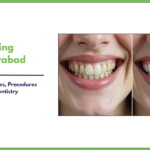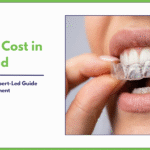Toothaches can be uncomfortable at any time, but many people find that the pain becomes more intense at night. This can make it difficult to sleep and may cause stress or worry. There are several reasons why tooth pain often feels worse at night—such as increased blood flow to the head when lying down, fewer distractions from the pain, or even late-night teeth grinding. We’ll explore the common causes of nighttime toothaches, how your sleeping position and daily habits can affect the pain, and what you can do to relieve it. If tooth pain persists, it’s important to consult a trusted dental professional. For expert care and lasting relief, Ocimum Dentistry, the best dental clinic in Jubilee Hills, Hyderabad, offers advanced treatments tailored to your needs.
Why Do Toothaches Hurt More at Night
Increased Blood Flow When Lying Down
When you lie down, blood flow to your head increases, which can put more pressure on sensitive or inflamed areas in your mouth. This often makes toothaches feel more intense at night.
Fewer Distractions
During the day, you’re often busy and distracted. At night, the quiet makes you more aware of every throb or ache, amplifying the sensation of pain.
Hormonal Changes
Your body’s natural anti-inflammatory hormones, such as cortisol, decrease at night. Lower levels of these hormones can make inflammation and pain from dental issues feel worse.
Late-Night Eating Habits
Eating sugary or acidic foods late in the evening, especially without brushing afterward, can aggravate dental problems and worsen nighttime tooth pain.
Teeth Grinding (Bruxism)
Some people grind their teeth at night, which can increase pressure on teeth and gums, leading to or worsening toothaches.
What causes toothaches to get worse at night?
Increased blood flow, hormonal changes, and fewer distractions all contribute to heightened pain at night. Conditions such as cavities, gum infections, or impacted wisdom teeth can become more noticeable when you’re trying to sleep.
How can I relieve a toothache at night?
Try these dentist-recommended strategies:
- Take over-the-counter pain relievers as directed.
- Use a cold compress on your cheek to reduce swelling.
- Elevate your head with extra pillows to minimize blood flow to the painful area.
- Rinse with warm salt water to soothe inflammation.
- Avoid sugary or acidic foods before bed.
Are there natural remedies for nighttime toothaches?
Some people find temporary relief using clove oil, peppermint tea bags, or warm salt water rinses. However, these remedies only offer short-term comfort. Persistent pain should always be evaluated by a dental professional.
When should I see a dentist for a toothache?
If your toothache lasts more than two days, is severe, or is accompanied by swelling, fever, or difficulty swallowing, contact a dentist immediately. Persistent or severe pain may indicate an infection or other serious dental issue that requires prompt professional care.
Quick Tips: How to Sleep with a Toothache
- Take pain relievers as recommended by your dentist
- Apply a cold compress to the affected area
- Keep your head elevated
- Rinse with salt water before bed
- Avoid foods and drinks that can worsen pain
- Use a numbing dental gel if advised
Toothaches often feel worse at night due to natural changes in blood flow, hormone levels, and the absence of daytime distractions. While home remedies can provide temporary relief, it’s important to address the underlying cause of tooth pain with professional dental care. Don’t let nighttime tooth pain disrupt your life-contact Ocimum Dentistry, the best dental clinic in Jubilee Hills, Hyderabad, for expert care and compassionate support.





